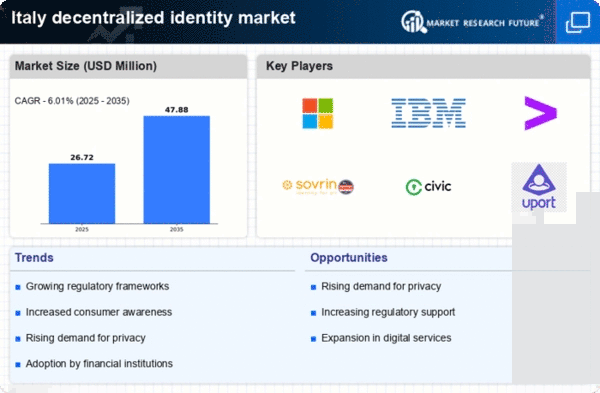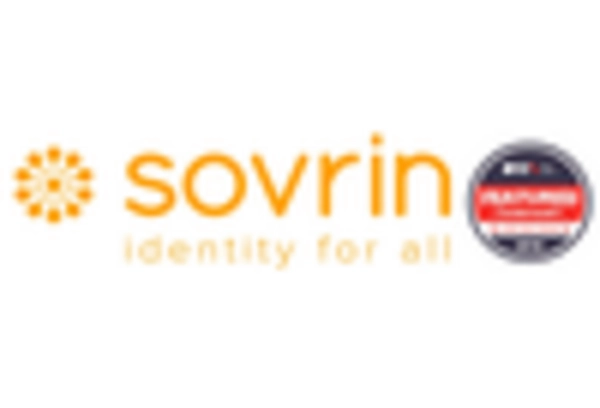Growing Awareness of Data Privacy Issues
In recent years, there has been a marked increase in public awareness regarding data privacy issues in Italy. Citizens are becoming more cognizant of the risks associated with centralized data storage and are advocating for solutions that prioritize individual control over personal information. This shift in consumer sentiment is propelling the decentralized identity market forward, as users seek alternatives that offer enhanced privacy protections. Surveys indicate that approximately 65% of Italians are concerned about their data security, which suggests a strong market potential for decentralized identity solutions that empower users to manage their own identities securely.
Rising Demand for Secure Digital Transactions
The increasing reliance on digital transactions in Italy has led to a heightened demand for secure identity verification methods. As businesses and consumers seek to protect sensitive information, the decentralized identity market is positioned to address these concerns. In 2025, it is estimated that the value of the digital transaction market in Italy will reach approximately €200 billion, with a significant portion attributed to the need for robust identity solutions. This trend indicates that organizations are likely to invest in decentralized identity technologies to enhance security and trust in online interactions. Consequently, the decentralized identity market is expected to experience substantial growth as it aligns with the evolving needs of digital commerce.
Collaboration Between Public and Private Sectors
The collaboration between public and private sectors in Italy is fostering innovation within the decentralized identity market. Partnerships between government agencies and technology firms are facilitating the development of new identity solutions that meet regulatory requirements while addressing user needs. This synergy is expected to enhance the overall ecosystem for decentralized identity solutions, making them more accessible and effective. As these collaborations expand, they are likely to drive the growth of the market, with estimates suggesting that investment in decentralized identity technologies could exceed €1 billion by 2027, highlighting the potential for significant advancements in this field.
Technological Advancements in Identity Verification
Technological innovations are playing a crucial role in shaping the decentralized identity market in Italy. Advancements in biometrics, cryptography, and blockchain technology are enabling more secure and efficient identity verification processes. For instance, the integration of biometric authentication methods is expected to enhance user experience while ensuring higher security standards. As these technologies evolve, they are likely to attract investments and drive the adoption of decentralized identity solutions. The market is projected to grow at a CAGR of 25% over the next five years, reflecting the increasing reliance on advanced technologies for identity management.
Government Initiatives for Digital Identity Frameworks
The Italian government has been actively promoting initiatives aimed at establishing a comprehensive digital identity framework. This includes the implementation of policies that encourage the adoption of decentralized identity solutions. Recent reports suggest that over 70% of Italian citizens are in favor of a government-backed digital identity system, which could streamline access to public services and enhance security. Such initiatives not only foster trust among users but also stimulate the decentralized identity market by creating a conducive environment for innovation and investment. As these frameworks develop, they are likely to drive the demand for decentralized identity solutions across various sectors.
















